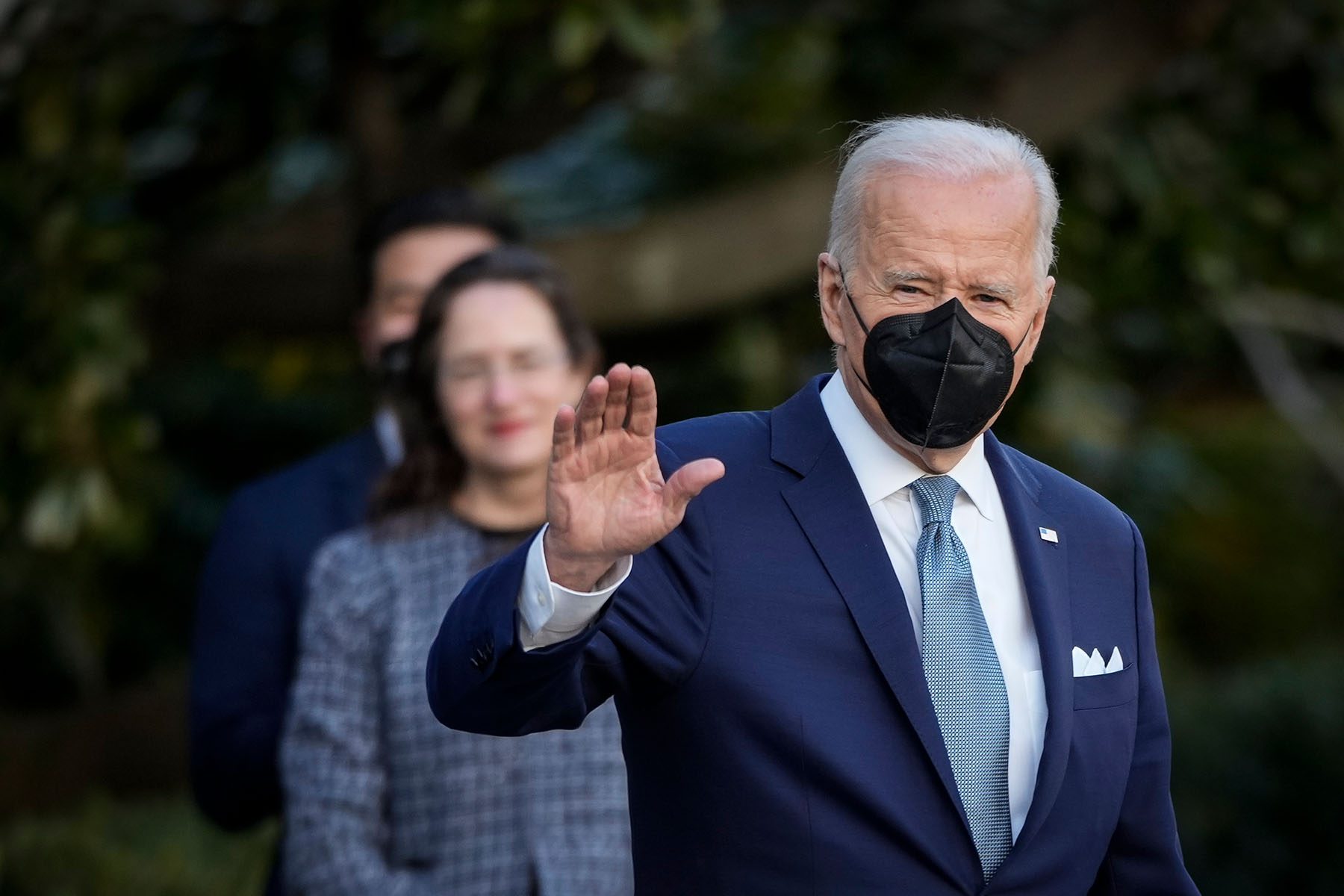President Joe Biden is set to give his first official State of the Union address at 9 p.m. ET Tuesday more than 400 days after he took office. The speech that will be shaped by the ongoing COVID-19 pandemic, inflationary pressures and the Russian invasion of Ukraine. He’s expected to tout progress on the economy, while also promising more, and highlight infrastructure investments from legislation passed last year. He’ll be doing it in the wake of a just-lifted mask mandate at the Capitol — which will be ringed with fences due to concerns about protests inspired by road-blocking demonstrations in Canada over vaccine mandates.
Biden gave a speech last year that looked similar. Officially, though, that was an address to a joint session of Congress. It was the first time ever that two women had stood behind the president as he addressed both chambers, with Kamala Harris as vice president and Nancy Pelosi as speaker of the House. This will officially be the first State of the Union address where the president is backed by two women.
Here’s what The 19th’s staff will be watching during this address.
What will Biden say about
… Build Back Better?
We’ll be watching whether Biden gives indications about when the White House will pivot back to focusing on the proposed $1.8 trillion Build Back Better plan, a sweeping economic package that would, among other things, create a universal pre-K system, subsidize child care for many U.S. families and establish climate change mitigation programs. When the package abruptly faltered in December it came as a surprise, and the main objections were from Democratic Sen. Joe Manchin of West Virginia over a proposed extension of an expanded child tax credit. Talks in the Senate have continued, but the White House has been less visibly involved in negotiations.
— Amanda Becker, Washington correspondent
… inflation and employment?
We’ll be watching closely what the president has to say about the impact of inflation on the lowest-wage Americans. Some of the largest price hikes have come in rent, groceries and utilities — also where the lowest-wage workers spend most of their earnings. The vast majority of those people are women, mothers and LGBTQ+ people.
Two years out from the start of the pandemic, these are also the groups that have not recouped the employment losses they experienced in 2020 and 2021. Men and White women are back to their pre-pandemic employment levels, but women of color, especially, continue to lag behind. Will the president address what more needs to be done to help these groups? The administration hoped the care provisions in its Build Back Better package would give women in the workforce the infrastructure they needed to return to work, but with that package all but dead, what is the Biden administration’s next plan for what it called one of its key priorities, particularly as it relates to child care and paid leave?
—Chabeli Carrazana, economy reporter
… energy costs?
We’ll be watching for more details on how Biden plans to cut energy costs for American households. Low-income people in the United States spend disproportionately more on energy due to factors including poor housing stock and outdated, inefficient appliances. If the Biden administration can find a way to target these energy cost reductions to the people who need it most, it could begin to address this burden. But some incentive structures can widen this inequality. Rebate programs in the past have resulted in middle-income families being able to adopt things like electric vehicles or solar panel installations more quickly, whereas lower-income households can’t take advantage of the programs since they often don’t have that money up front.
— Jessica Kutz, climate and sustainability reporter
… LGBTQ+ issues, particularly trans rights?
We’ll be watching whether the president makes any new policy promises to LGBTQ+ Americans as legislation targeting them floods statehouses. The president has been clear in opposing the tide of anti-transgender bills and in calling for the passage of the Equality Act, federal nondiscrimination protections for LGBTQ+ people.
But the White House has yet to use its full might to combat anti-transgender sports bills that violate federal law. On his first day in office, Biden signed an executive order enforcing the Supreme Court’s landmark 2020 Bostock v. Clayton County decision, which found that sex discrimination protections applied to LGBTQ+ people. But the federal government has yet to aggressively enforce the ruling or the executive order, reiterating “transgender rights are human rights” without detailing plans to combat the legislation or move the Equality Act.
Will he respond to Texas Attorney General Ken Paxton’s opinion that certain types of gender-affirming care are “child abuse,” or the bill in Florida popularly known as “Don’t Say Gay” that bans discussion of sexual orientation or gender identity in schools? We’re watching to see if Biden is willing to commit any executive branch agencies to specifically responding.
— Kate Sosin, LGBTQ+ reporter, and Orion Rummler, breaking news reporter
… voting rights
This address comes ahead of the March 7 commemoration of Bloody Sunday, when civil rights marchers were beaten back attempting to cross the Edmund Pettus Bridge in Selma, Alabama, on their way to the Capitol in Montgomery to push for voting rights. We’ll be listening for if and how he frames the ongoing battle between voting rights and voter suppression sweeping across state legislatures and currently stalling in Congress. White House officials have maintained that voting rights is a priority for them, and it will likely be a key issue in this fall’s midterms, particularly for Black voters who form the cornerstone of the Democratic Party and want action. Will Biden announce new executive orders or renew his challenge to federal lawmakers to take action though nothing has made its way through both chambers of Congress so far?
— Errin Haines, editor at large
… home care and other issues for people with disabilities?
Expansion of home care for seniors and people with disabilities was a major part of Biden’s original Build Back Better agenda, though it shrunk through the negotiation process and its prospects are now unclear. Xavier Becerra, secretary of health & human services, met with aging, labor and disability groups earlier this month about the topic, signaling that the issue may not be dead yet. A mention during the State of the Union would be clearer still.
Finally, and unexpectedly, we’ll be watching to see if Biden mentions subminimum wage for people with disabilities. It’s a somewhat obscure issue; a 1937 law allows some people with disabilities to be paid pennies per hour. But a mention appeared in statements from the White House sent ahead of the president’s address. It would be the first time any U.S. president has brought up the issue during a State of the Union address since the law was passed.
— Sara Luterman, caregiving reporter
… abortion?
Across the country, conservative-led states are pushing bills to restrict abortion access, as many anticipate the Supreme Court will issue a decision this summer completely or partially overturning Roe v. Wade, which guaranteed the right to an abortion. Biden has called abortion access a priority for his administration, but most legislation is a non-starter in Congress. The Women’s Health Protection Health Act, which would codify abortion rights, failed Monday in the Senate. During Tuesday’s speech, we’ll be listening for any specific proposals on how the Biden administration might use its executive authority to address abortion access or to challenge the new abortion restrictions statehouses are passing.
We’ll also be listening for whether Biden uses the word “abortion.” Since being elected president, Biden has been hesitant to use the word: He has done so only a couple of times in print, and not at all verbally. He often uses “Roe” as shorthand, but at a time when there is a declining understanding about what that means, it could complicate Democrats’ midterms messaging.
— Shefali Luthra, health care reporter, and Amanda Becker, Washington correspondent
… drug prices and mental health
We’ll also be watching whether the president announces any initiatives around mental health care or prescription drug pricing. Bringing down drug prices was a major component of Build Back Better, and a proposal that would disproportionately benefit women, who are more likely to skip prescriptions because of their high costs. The COVID-19 pandemic has exacerbated gender disparities in both depression and anxiety, with women and LGTBQ+ people reporting far higher rates of both conditions. So far, we haven’t seen any government action to address those concerns.
— Shefali Luthra, health care reporter
…. higher education?
We’ll be watching how Biden addresses college affordability. Free community college was a Biden campaign goal and part of his Build Back Better plan, but the measure appeared to have fallen out of the legislation even before it stalled. Separately, Americans hold more than $1.7 trillion in student loan debt, and two-thirds of it is held by women. Black women are particularly affected by student loan debt, owing nearly $10,000 more on average one year after college graduation than White women do. In December, Biden extended the pandemic-era moratorium on federal student loan payments to May, but has stopped short of broad student loan forgiveness.
The White House has said the president plans to call on Congress to increase the maximum Pell Grant award by more than $2,000 to make college more affordable for low-income students. Additionally, he will ask Congress to expand existing institutional aid grants in high-demand fields like STEM, computer sciences, nursing and allied health at historically Black colleges and universities, tribal colleges and universities and minority-serving institutions.
— Nadra Nittle, education reporter
… pandemic safety measures
We’ll also be watching how Biden acknowledges and frames protecting some of the most vulnerable Americans from the pandemic, particularly young children who cannot be vaccinated yet, seniors and people with disabilities. Many have felt increasingly abandoned as the Biden administration has rolled back masking requirements and other pandemic mitigation strategies.
How will he talk about the pandemic in terms of the current state of K-12 schools? A year ago, schools remained largely remote. Now schools are widely open for in-person learning, and some have lifted COVID-19 restrictions such as mask mandates, a move cheered by some but a source of worry for others, especially parents of children with disabilities.
— Nadra Nittle, education reporter, and Sara Luterman, caregiving reporter
…. the Supreme Court
On Friday, Biden made the historic announcement that he has nominated Judge Ketanji Brown Jackson as an associate justice on the U.S. Supreme Court, a decision that could give voice to new perspectives on some of the country’s most high-profile legal debates. If confirmed, she would be the first Black woman and the first former federal public defender on the nation’s highest court in its 232-year history. Biden’s choice not only fulfills a campaign promise he made two years ago, but it captures his broader efforts to diversify the country’s federal courts.
As of the end of January, about 78 percent percent of Biden’s confirmed judicial picks were women and about 57 percent were people of color. He has already appointed more Black women to federal appellate courts than any other president, and has also nominated more judges with public defender experience than past administrations.
Coming off the heels of the Supreme Court nomination, we’ll be watching how Biden speaks about Jackson and addresses potential misinformation about her qualifications or questions about her progressive reputation and ability to garner bipartisan support. The White House has published a website that summarizes some of her personal and professional background, and a number of groups have already kicked off ad campaigns touting Jackson’s attributes.
— Candice Norwood, breaking news reporter






